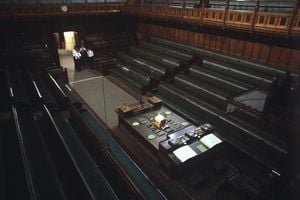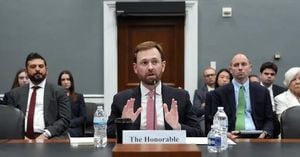Since the dawn of the new millennium, few names have stirred as much conversation and contention as Elon Musk. Recently, his influence has reached the heart of the U.S. government, particularly the Office of Personnel Management (OPM). This takeover, perceived as hostile by many, has ignited fears over cybersecurity and the future governance of federal systems.
On January 31, 2025, Congressman Gerry Connolly (D-VA), who serves as the Ranking Member of the House Committee on Oversight and Government Reform, released a damning statement concerning Musk's takeover of the OPM. Connolly expressed, "Elon Musk’s hostile takeover of the Office of Personnel Management, sanctioned by Donald Trump, is putting Americans in danger. Since Trump handed Musk the keys to our government, it’s been reported…" He continued to voice serious alarm over Musk's newly assigned role which included setting up private servers, issuing unsanctioned resignation offers, and locking long-standing civil servants out of agency systems.
Critics have described the situation at the OPM as unsettling, with multiple federal officials raising concerns about the lack of transparency coming from the office. Reports suggest the new leadership under Musk has started sending out memos encouraging federal employees to contemplate voluntary buyouts, promising eight months' salary as incentives. This tactic reflects methods previously employed by Musk at Tesla, all of which have now raised significant questions about the legality and ethics of such maneuvers.
The primary worry revolves around cybersecurity. David A. Lebryk, the then-highest career official at the U.S. Treasury Department, resigned his position rather than allow Musk’s team access to government payment systems, signaling the urgency of the situation. The systems involved are considerable, including the Enterprise Human Resources Integration database, which holds sensitive personal data of numerous federal employees such as Social Security numbers, pay grades, and home addresses. An anonymous official warned, "We have no visibility to what they are doing with the computer and data systems. It creates real cybersecurity and hacking implications."
This unprecedented disruption has exacerbated fears around government oversight. There is widespread concern among public servants and officials alike about how these changes might lead to potential misuse of sensitive data, leading to serious cybersecurity nightmares. Congressman Connolly assertively stated, "The actions of Co-Presidents Musk and Trump will have disastrous consequences not just for the civil servants whose lives they are upending, but for the American people who will suffer as a result."
The shake-up at OPM reflects what broader changes may surface within the federal system, as Musk's administration appears to be at odds with traditional bureaucratic processes. This is igniting renewed discussions across the government spectrum concerning accountability and the extent of executive influence over federal agencies.
The question now is whether Congress can rein it back. With suspicions growing surrounding Musk’s aggressive style and the lack of established oversight, many are demanding immediate answers to safeguard public trust and integrity within the federal bureaucracy. The ramifications of this takeover extend beyond mere personnel changes; they embody the very essence of how the government might function moving forward. Critiques focused on the transitional turbulence Musk instigates serve as a reminder of the delicate balance between innovation and oversight—a balance currently at risk.
While the OPM transition continues to evolve, it remains to be seen how entrenched bureaucratic processes will respond to Musk's ambitious approach. The rising tension between established systems and new administration strategies will be under constant scrutiny as stakeholders from all sectors seek clarity and direction.
Elon Musk's entering of federal systems has undoubtedly sent shockwaves throughout Washington. Whether one views this as positive or negative, the truth is clear: this development finds itself at the intersection of technology, governance, and the public trust, raising urgent questions about the future of both innovation and regulation within the corridors of power. With Congress on alert, the ensuing weeks will likely yield heated debates over the preservation of civil service integrity and the fundamental principles of American governance as the country grapples with these rapid changes.



